
updated 6/20/2022 ⎮ 40 min read ⎮ Digital marketing
If you're a small business owner with little experience in digital marketing, this might all sound like a foreign language to you. Have no fear – we'll go through what all these things mean, and why you should care about them!
In this post, we'll give you answers to the most commonly and frequently asked digital marketing questions. This will help you build and optimize your marketing strategy, and set you up to attract new clients and ultimately grow your small business.
Whether you're in the process of launching a new business or already have one, having a strong online presence for your brand is extremely important. In fact, IBISWorld estimates that the percentage of business conducted online has reached 30.8% in 2021. And consumers learn about local businesses online more than anywhere else.
Marketing is meant to raise brand awareness and build a pipeline of qualified leads that turn into sales. Small business owners looking for a way to track ROI and brand awareness need digital marketing. Not only is digital marketing a must-have for promoting your products or services, but optimizing your online assets is also critical to your business' overall success. For local businesses, it's equally important to have essential and updated information readily available online for potential clients.
Small Business Marketing Digital Marketing Questions
1. What is digital marketing?
Digital marketing is any form of marketing that involves electronic devices. People can see the forms of digital marketing on digital channels and through digital media. This means it's mainly on the internet but can be done offline, too.
Examples for offline digital marketing are electronic billboards, software demos, radio marketing, TV marketing, and phone marketing. Online digital marketing examples are Search Engine Optimization (SEO), email marketing, and social media marketing.
2. Why is digital marketing important?
The average American spent 9.4 hours a week online in 2000, today it's 23.6 hours. The number of people accessing the internet from mobile devices has risen from 23% in 2010 to 84% now. Smartphone email use jumped from 21% to 79%. These numbers are from a study done by the University of Southern California.
The time people spend on the internet with their devices is continuously increasing. When we want to reach people with our marketing, we must meet people where they are - on electronic devices.
3. What is online marketing and what is the difference to digital marketing?
Digital marketing can be done both online and offline. Online marketing therefore is a subcategory of digital marketing and it makes up the majority of all digital marketing efforts.
When you e.g. order your food in a restaurant from a tablet, you're using an electronic device that delivers marketing messages and advertisements to you in a digital format but without using the internet.
Online digital marketing in contrast involves the internet and e.g. uses social media, emails, or websites. Learn more about online and offline digital marketing.
4. What is the difference between digital marketing and traditional marketing?
Conventional marketing communicates value to people using traditional channels. Digital marketing does just that using digital channels.
5. Do small businesses need digital marketing?
Yes. Small businesses need to take advantage of cost-effective ways to promote their offerings, reach their audience, expand, grow, and scale.
6. How does digital marketing work?
Just like marketing, digital marketing works by providing information to a target audience with the goal to get attention, awaken interest, generate awareness, and make sales.
7. What are different digital marketing types and what does digital marketing include?
Here's the full breakdown of digital marketing.
Online Digital Marketing
- Social Media Marketing (SMM)
- Email Marketing
- Lead generation
- Search Engine Optimization (SEO)
- Search Engine Marketing (SEM)
- Conversion Rate Optimization (CRO)
- Pay-Per-Click Advertising (PPC)
- Content Marketing
- Marketing Analytics
- Affiliate marketing
- Mobile Marketing
- Native Advertising
- Marketing Automation
- Online PR
Offline Digital Marketing
- Enhanced Offline Marketing
- Digital product samples and demos
- Electronic billboards
- Radio Marketing
- Radio commercials
- Show sponsoring
- TV Marketing
- Tele shopping
- TV commercials
- Super Bowl commercials
- Phone Marketing
- Cold calling
- QR codes
- Text message marketing
8. How can I include different channels in my digital marketing strategy?
It is important to know your target customers well and listen to what they want, need, and expect. Then you can pick marketing channels where they are active and susceptible to your marketing, and expand over time as you gain traction.
9. Why do I need to focus on so many different digital marketing strategies?
Putting all your eggs in one basket can be dangerous and detrimental. Today, a single-minded approach to digital marketing will exclude large portions of your audience, and can prevent a small business from remaining competitive. Digital marketing should be a comprehensive approach.
10. What is a marketing campaign?
A marketing campaign is an organized and strategized marketing effort to reach a company goal.
11. What is a call-to-action (CTA) and how do I create it?
A call-to-action (CTA) is a type of prompt to get a user to take a desired action. It can come in many different designs and typically is prominent, direct and succinct, so users can't miss it or misinterpret what the next step to take is.
Call to action examples are 'Learn More', 'Buy Now', 'Call Today', or 'Sign Up Today For Free', or 'Schedule A Consultation''. CTAs should be included everywhere it's appropriate to invite people to be guided in the direction where you can help them.
12. How do I write a great call-to-action (CTA)?
The best calls to action are clear, concise, simple, catchy, and get the audience to click on them.
As the LIFT model suggests, a CTA should convey the value proposition of what you're offering while being relevant and clear. Distractions and anxiety reduce the effectiveness of a CTA and cause drop off. A sense of urgency on the other hand boosts the effectiveness even more as more people take action.
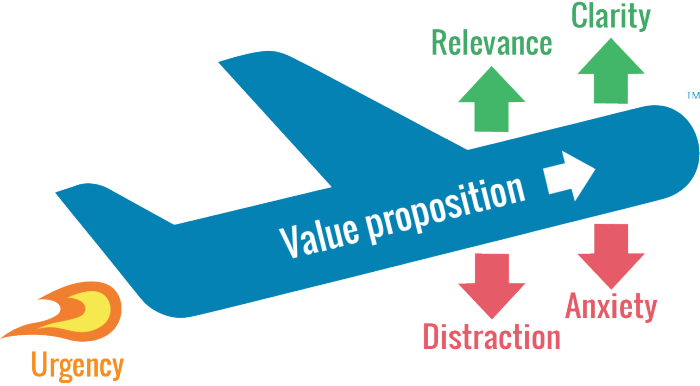
'Click here' or displaying a link like 'https://example.com' just won't cut it if you want to see high conversion rates.
Start with an imperative and start strong. Use authoritative language and action verbs that direct people and convince them to do something. Try some of the following power words and action verbs for your call-to-action:
- Download
- Get
- Grab
- Claim
- Take Advantage Of
- Subscribe
- Join
- Sign Up
- Refer
- Start
- Get Started
- Try
- Save
- View
- Shop
- Buy
How your CTA looks play a role, too. Make it pop! Be sure to use a contrasting color for your subscribe button and is surrounded by enough white space, so that it really pops out on the page and is eye-catching.
Also, make it big! It has to be very clear that this is what you want the person to click on and they can't possibly miss it.
Make it high-value and low-risk. People don't like to feel pressured or commit to anything. A good CTA promotes a high value yet is low risk for your audience. Employ a zero-pressure approach. Ticking clocks are not a state-of-the-art technique anymore. Let your audience know that they are simply finding out more without committing to anything.
Use persuasive writing skills. Copywriters often craft a good call to action by using persuasive language. Use words that persuade people to follow your direction. Keep your CTA copy concise to build intrigue and make your audience want to learn more. Create a value proposition—create an incentive that benefits people, like saving money or lower rates.
Some of the best CTAs create a sense of urgency in their message. Let people know that this is their chance to shop a limited offer before it's too late.
13. How much money should I invest in digital marketing?
A good rule of thumb for startups and small businesses is to spend around 10% of the gross revenue on marketing.
14. What is Conversion Rate Optimization (CRO)?
Conversion rate optimization (CRO) is the process of increasing the percentage of visitors to a website that convert into customers, or more generally, take any desired action on a webpage.
Conversion optimization consists of researching and testing how a site can increase its ratio of visitors to actual customers. It helps you to get more people to take a desired action (usually making a purchase) rather than simply viewing content and leaving.
15. What is online public relations (PR)?
Online public relations marketing is the practice of deliberately managing the communication between an individual person or an organization and the public. There are certain things about your small business you want to strategically share with the public to build your online presence and influence the way your brand is being perceived. And there are things you'd rather not disclose publicly and keep internal. Online PR can help you to gain authority and generate valuable mentions, citations, and links.
16. What is online reputation management?
Reputation management is the effort to influence what and how people think of a brand or person when viewed online. Put another way, character is who you are and reputation is whom other people think you are.
Online reputation management can turn your customers into advocates of your brand, control what shows up on search engine results pages when people search for your name, etc. A good reputation is important and you can be incontrol of it.
17. What does a small business marketing consultant do?
A consultant is a person who offers to help improve a company's position by lending their expert knowledge. Consultants can assist in managing a process, solve a problem, or improve the general efficiency.
18. Why is it important to develop your employees in the digital age?
Employees are a true asset of a company. Each one contributes to the business goals. It is in your best interest to keep your people motivated and engaged, so they will give their best everyday, and to remain capable and loyal.
This includes the ability to understand and work with the latest technology to help you grow your online presence and market your small business online.
19. What's the future of digital marketing?
Digital marketing is more resource-efficient than traditional marketing. It allows you to monitor, measure, analyze, and test faster and better. In the future, it will continue to be more precise and effective as new technologies bring new opportunities.
Branding Digital Marketing Questions
20. Is it really worth it to make your company a brand?
Yes. Brands are becoming more and more popular and attract all kinds of customers. This is because people like to support people they can identify with and share their beliefs and values. We like to belong to a group of people who are like us or how we want to be. For ambitious companies it is important to build a strong brand to increase customer loyalty. A well-developed brand tells an emotional story to build a connection. Learn how to build a brand in our free branding course with certificate.
Website Marketing Digital Marketing Questions
21. How do I get a modern and optimized website for my small business?
Modern websites feature large fonts for good readability, big hero images or background videos, have a flat structure and minimalistic design with little distractions, and offer a good user experience (UX).
22. How can I drive traffic to my small business website?
There's quite a lot you can do. For example, you can share links to your website in your social media posts and in the bios of your social media profiles, and include links in your email signature and email newsletters.
SEO Marketing Digital Marketing Questions
23. What is Search Engine Optimization (SEO)?
Search Engine Optimization (SEO) is the process of optimizing a website to increase the visibility of its pages on search engines in order to attract more relevant traffic.
24. Why is Search Engine Optimization (SEO) important?
Google is used by billions of people everyday to find what they're looking for. The potential visitors you can get from Google are not just any visitors but people who are already looking for what you provide. These ideal visitors are the most likely to convert into customers. However, most people only bother for the top search results on the first page. This is why it is important for you to rank high and invest in SEO for your website.
25. How can I rank high in Google Search results and get free organic web traffic?
It all starts with understanding the competitiveness. You'll need well-written content that is helpful, credible, relevant, answers the search query, and comes from an authoritative source that offers a good user experience (UX). Get our ultimate SEO checklist for small businesses in 2022.
26. How long does it take for SEO to work?
Some SEO results can be seen in minutes, while others take months. Depending on the competitiveness of your industry, it can take all the way from 3 months up to several years to rank your pages on Google's first page.
27. When can I stop doing SEO?
Stopping SEO is like stopping to go to the gym. You will not notice an immediate difference but over time your rankings and traffic will drop. As long as search engines will be a thing, ranking high in them will be important.
28. What's the difference between organic rankings and Google Ads?
Google Ads is an advertising platform in which businesses pay to run ads to their sites. These ads will appear on top of the organic search results and will stop to appear as soon as the business stops paying.
The organic rankings are not paid for but earned by creating high-quality, relevant, and helpful content and optimizing it to rank in search engines. SEO results are more long-term and not paid-per-click for.
29. Why is keyword research important?
While keyword research certainly isn't the only approach to improving rankings, it's fundamentally important. SEO campaigns use keyword research to determine what competitors are ranking for and which words or long-tail phrases should be targeted for on-site optimization. Without keyword research, it's difficult to know what your target audience is searching for and how to optimize your site accordingly.
30. Why can't I just add in ranking keywords to my content?
Simply stuffing a bunch of keywords in your content is a bad practice that won't help you rank. Google can pick up on this. They reward sites that focus on creating helpful, meaningful, high-quality content when it comes to ranking. And there are many other 'ranking factors' besides keywords on the page. Keywords should be incorporated naturally in your content where appropriate.
31. How can I avoid Google penalties?
The best way to avoid Google penalties is to adhere to Google's guidelines.
32. Why is mobile-friendliness important for SEO?
There are more searches performed on mobile devices than on desktop computers. Google has recognized that and adapted to it by prioritizing responsive, mobile-friendly websites in their rankings.
33. Why is blogging valuable for SEO?
To get more relevant traffic to your website organically through search engines, you need pages with content that can rank. A blog simply is a very effective way to share valuable content with users.
According to 2021 blogging statistics from a survey, 60% of internet users are regularly reading blogs. 39% of them do so 1-3 times a week, 10% 4-6 times a week, and 11% are reading blogs every day.
Hubspot came out with these business blogging stats for 2021. Marketers who blog are 13x more likely to achieve a positive ROI. Websites with blogs have up to 97% more inbound links than sites without blogs. Websites that contain blogs get on average 434% more indexed pages. Businesses that maintain blogs get up to 55% more visitors.
34. Is video important for SEO?
Yes. Video marketing can help your SEO. In fact, one study reported that web pages with videos are 53X more likely to rank on the first page of Google. Searches are blended, meaning they can display a mix of web pages, PDFs, videos, and images. Videos are in the running to appear in top search result spots because videos are seen as more engaging and favorable to users. Including videos on our web pages, especially embedding your YouTube videos, can certainly help you get more organic traffic.
35. Does web design affect SEO?
The site structure and web design of a site can affect its rankings and overall traffic. A web design should provide an aesthetic, intuitive and easily navigable interface, and the site structure should be an interlinked, flat hierarchy. This provides a good basis to publish content on that users are able to understand and interact with and find what they are looking for. As a result, you face less indexing issues, lower the bounce rate, and can rank better.
36. What are meta tags?
Meta tags are elements in HTML code that contain information about a web page. They can help search engines to understand the content of a page better. That's why they are important areas to optimize for SEO and include keywords and copywriting in. Search engines access certain meta tags so they can, for instance, display a page title and description in the search results.
37. Why is image alt text important?
The alternative text – short alt text – is an attribute of the image tag in HTML code to describe the appearance and function of an image on a page. The computer algorithms search engines use to crawl the web can't see web pages like humans can see them. They can't just look at an image and know what's shown on it. They rely on math and code to get that context and information. This is why filling out the alt text attribute for each image on your website is important for SEO.
It's also important for web accessibility and allows visually impaired users using screen readers to better understand images, too. Alt text also will be displayed in place of an image if an image file cannot be loaded.
38. What are the best ways to locally optimize my website for local SEO?
Local SEO is the practice of optimizing your website for a specific local area. If you have a local business, like a shop, restaurant, or agency, you want your web pages to rank for certain search queries performed by a local audience.
Optimizing the website of your local business is about making sure people can find you online and offline. You can do that in part on your own website, but there's a lot more you can do e.g. leveraging business directories, social media, Google My Business and Google Maps.
39. Why does adding my business to local directories help my SEO?
In the early days of SEO, web directories were the thing. If your site was listed on a ton of online directories, it must be pretty dang special – or at least, that's how the Google algorithm saw it. The number of directory links you had positively influenced how well your site ranked in the search engines and marketers used this to game the system.
Today, Google's algorithm is a lot more complex. While links are still one of the top ranking signals, Google no longer views all links equally. Links from a web directory listing are a lot less influential than a super relevant contextual link from a high-authority site in your niche.
That's not to say web directories are completely meaningless. Instead of viewing business directories as a source just for backlinks, view them as a source of traffic and trust, and they can still help your SEO.
Marketing Communication Digital Marketing Questions
40. Why is marketing communication important?
Marketing communication brings people together and turns individuals into groups. Being able to create and convey a flow of information and learning how to present your ideas concisely and in a way that excites people to participate is a crucial skill in business and life.
Check out our blog post about must-have communication and leadership skills for small business owners with a team.
41. What is the best way to communicate with potential and existing customers?
Communication can make or break a business. The best way to communicate is using a channel the target recipient of a message is susceptible for receiving it and speaking their language. Additionally, you can make your customers feel like a priority, be available for support, use tools that help manage the customer relationship, and engage in non-sales-related ways, too.
User Experience (UX) & Customer Experience (CX) Digital Marketing Questions
42. What does the user experience (UX) include?
What a user experiences is the look, feel and usability of a product or service. A creative design that is intuitively to use, emotional and interactive, as well as informational, ensures the best possible experience for users.
Content Marketing Digital Marketing Questions
43. What is content marketing?
Content marketing involves the strategic and consistent creation and sharing of valuable and relevant marketing materials known as content. It does not explicitly promote a brand but is intended to stimulate interest in its products or services in a target audience to ultimately drive customer action.
44. What qualifies as content?
Any valuable marketing material or information conveyed in any medium can be considered content. Content marketing examples are videos, infographics, slideshares, PDFs, blogs, articles, podcasts, white papers, ebooks, webinars, email newsletters, images, or social media posts.
45. How can I get started with content marketing?
The only way to ensure that your content is set up to be effective is to take the time to create a content marketing strategy first. Without a clear plan in place, all the time you put into developing content could be wasted.
46. What are the steps to developing a content marketing strategy?
First, determine who your target audience is. Develop a buyer persona to whom your content should speak. Then, based on that buyer persona and your small business' brand image, decide on your brand voice, and the type of content you will be creating. Your content needs to be informative and valuable, as well as interesting and engaging to your target audience. And once you start producing content, constantly tweak your strategy to improve your success.
47. Do I need to constantly create new content?
Yes and no. Content creation needs to be ongoing and should be consistent. However, there are ways to simplify and automate the process, and you can always repurpose existing content. This entails creating content in one format and then reworking it several times in order to utilize that same information in other formats too. Not only does this approach lighten the workload of content creation, but it also allows the same content to be consumed by people with different preferences.
48. How often should I post fresh content on my site?
Every audience can have different content consumption patterns. It's just a matter of deciding how much time and effort you can devote to creating content. If your content is high-quality and valuable to your audience, it won't be perceived as annoying and the more often you post, the better.
49. Do I need a blog?
It is highly recommended. A chief reason every company needs a blog is to increase their visibility. Put simply, the more blog content you create, the more opportunities you'll have to show up in search engines and drive organic traffic to your website. Blogs provide the perfect platform to strengthen your content strategy.
In addition to providing you with compelling social media and email content, having a blog increases your company's credibility in the industry. Other professionals and your customers will see that you are keeping up with the latest news in your field and being transparent with all that is going on with your business.
50. How im portant is it to share my content on social media?
Very important. Creating content and then sitting back and hoping that visitors will find it is an exercise in futility. In fact, you should spend only 20% of your time on content creation, and the other 80% on promoting that content. Using social media as a content promotion channel is essential as it is free and very effective.
51. Is guest blogging part of a content marketing strategy?
Yes, it can be. Guest blogging, meaning being an author on other blogs, is essential for growing your online presence, being featured in the media, getting quoted and mentioned, being found on social media, and receiving backlinks to your website that are vital for SEO. Many publications accept guest posts and are always looking for high-quality content to add.
52. Do I need an editorial calendar?
Yes, it is highly advisable. To see the best results from content marketing you need to be consistent with it and be held accountable by a plan. You also need to plan and research topics, keywords, and more. You don't have to maintain a full-blown, detailed editorial calendar, but you should at least plan out your content a month in advance, and include the following columns in your content calendar spreadsheet:
- Which content you will create and publish
- When you will do so
- On which channels
- Which topics you'll create content around
- Which keywords to use
- What your headlines and titles will be
- Which hashtags to use to post your content
- How you will be repurposing your content
53. How important are keywords in content marketing?
Keywords are important in content creation for all types of content that can be discovered in search engines. Just remember that your priority is always to write for humans, not search engines.
54. How do I make my content engaging?
Speak to your target audience's pain points and interests, let them see that you understand them, want to help, offer the solution – and then open up the conversation. Ask questions, and invite them to respond in the comment section. Add tools, calculators, quizzes, etc. to your content users can engage with.
55. How can content marketing make me into an industry thought leader?
Yes. To be a thought leader you have to put your thoughts out there. Getting you known as a subject matter expert in your field is exactly what content marketing is meant to do. It's what creates a sense of trust in consumers and allows them to feel comfortable buying from you. By creating unique, original content, and answering questions customers have, you'll be on your way to becoming an industry thought leader in no time.
56. Is there a difference between B2C and B2B content marketing?
The most significant difference between B2B vs B2C content marketing is the target audience. While a B2C content marketing strategy focuses on a single consumer, a B2B content marketing strategy often requires marketing to one or more people within a business before the final decision-makers are involved. The goals of content marketing remain the same.
57. Should I create timely content or evergreen content?
Both. However, as a small business with limited resources it's advisable to prioritize creating evergreen content that will serve your business for months and years into the future and that you can repurpose and reshare in more ways to stay relevant and build a content library.
58. How can I incorporate big content into my content marketing plan?
'Big content', also known as content that requires significant time and resources, is all the rage today. Since big content can't be easily replicated, it makes more sense for people to link out to your asset than to create their own. The effort they would need to go to to produce something as good as, or better, is simply too much. To include big content in your content strategy, focus on creating skyscraper posts, conducting unique research and surveys, and going out of your way to make your content more helpful, comprehensive, and better.
59. Is short-form or long-form content better?
Find out what your audience prefers through testing and find a good balance to create both long-form and short-form content, as both come with pros and cons and it's not an either-or-question but rather a ratio-question.
60. How can I create content that converts?
The marketing and sales funnel includes multiple points of conversions.
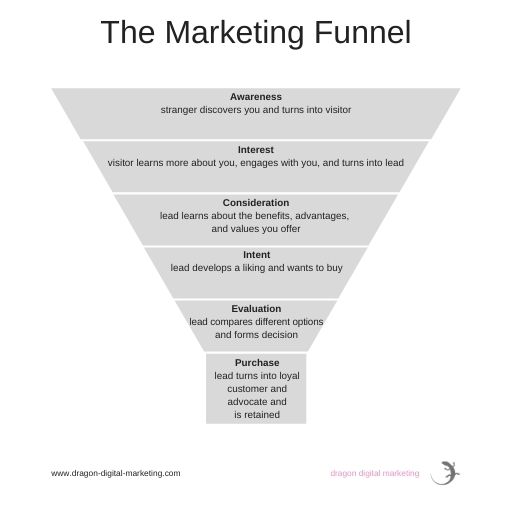
Craft different pieces of content targeted to each step of the conversion funnel and make sure not to forget to include solid calls-to-action throughout.
61. What are some common content marketing mistakes?
Common content marketing mistakes include publishing inconsistently, being overly salesy, promoting your business and its products or services excessively, not providing helpful answers, and not adding enough value.
62. How do I get people to read my content?
Promotion, promotion, promotion. Share your content in email newsletters, on social media, rank it in Google with SEO marketing, start a show or podcast, and use benefit-driven words and copywriting to intrigue and hook people to learn more.
63. How do I measure the success of my content marketing efforts?
Ultimately, the success of digital marketing can be seen in the number of conversions it creates. You can attribute clients, sales, and conversions to the individual pieces of content and track the exact results. A CRM will oftentimes keep track of the activity for you. A consumer typically needs several 'touches' before finally deciding to purchase. So keep that in mind when evaluating the success of your content pieces, not every content piece contributes to a sales conversion but can contribute to other important stages in the funnel as well.
Email Marketing Digital Marketing Questions
64. What is email marketing?
Email marketing is the practice of sending out emails to customers and prospects that provide them with relevant and valuable content on a regular basis and either directly or indirectly promotes a business.
65. Is email marketing still effective?
Email marketing is one of the most effective ways for a small business to reach customers directly.
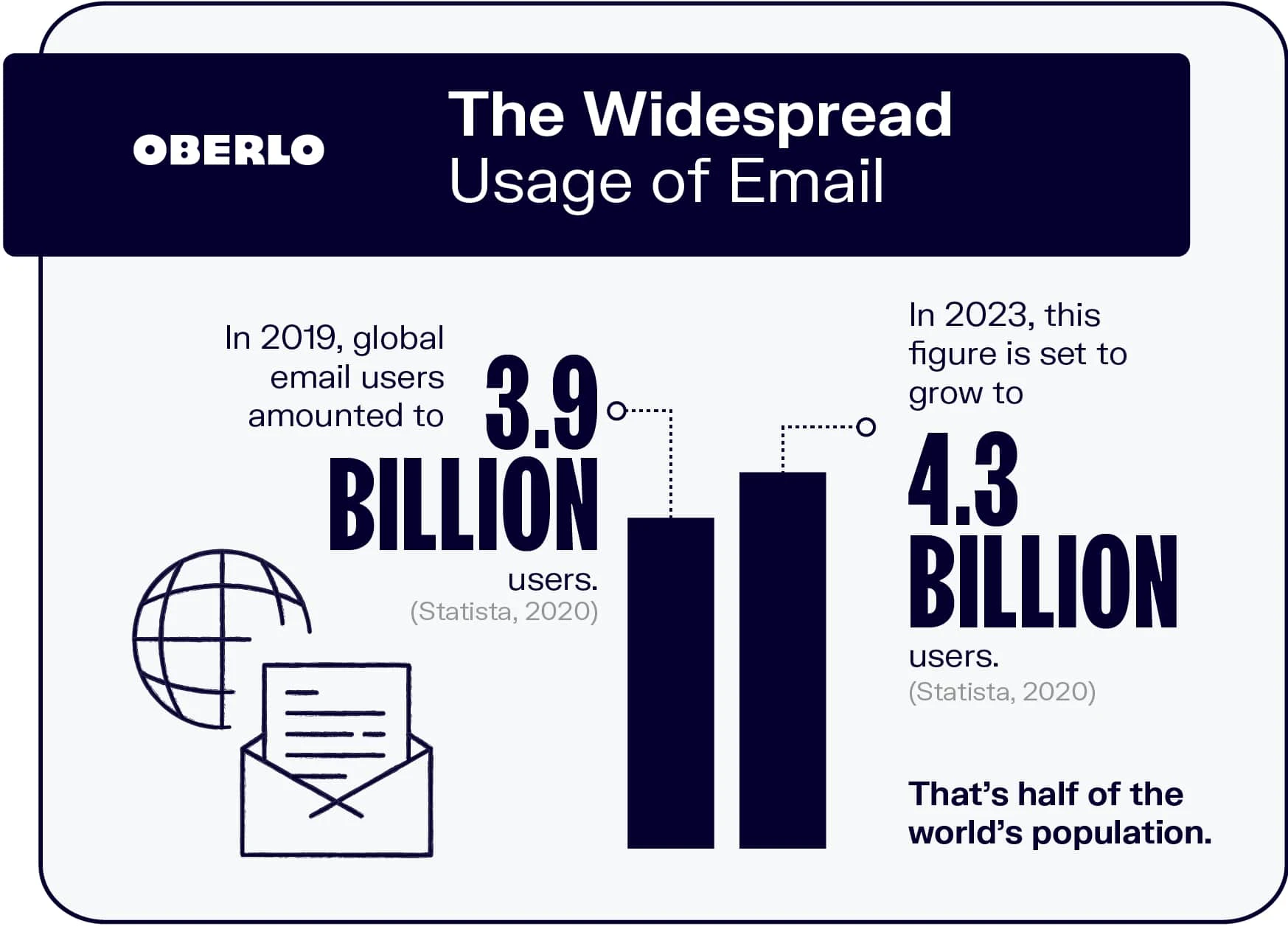
Think about it. You're not posting on your blog and hoping people will visit it. You're not even posting on a social media page and hoping fans will see it. You're sending messages directly into each person's inbox, where they will definitely see it. With email marketing, you're always directly communicating with your audience.
66. How can I grow my email list?
What most people do when they want to build an email list is put optin forms on their website and hope that people sign up. Unfortunately, this strategy usually doesn't work very well. To grow your email list, you need to attract people with a compelling offer. You need a lead magnet.
67. Isn't social media marketing taking the place of email marketing?
Social media marketing can't keep up with email marketing at all. Statistics have been showing this consistently over years. Email is at least 4 times more effective in reaching your audience than Facebook. Email reaches three times more people than Facebook and Twitter combined. That's a significant difference. In addition to that, studies show that the quality of the audience is higher with email subscribers than with social media subscribers, and that email readers are more task-oriented than people browsing on social media. And email subscribers are more open and susceptible to receiving promotional messages. This explains the much larger ROI of email marketing, too.
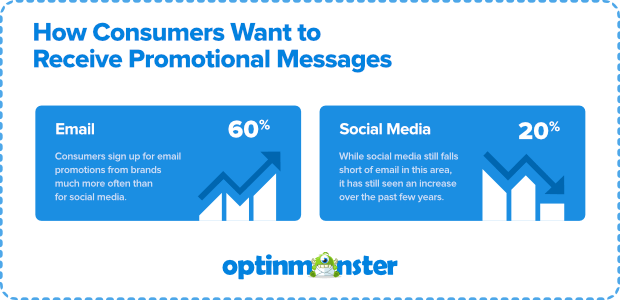
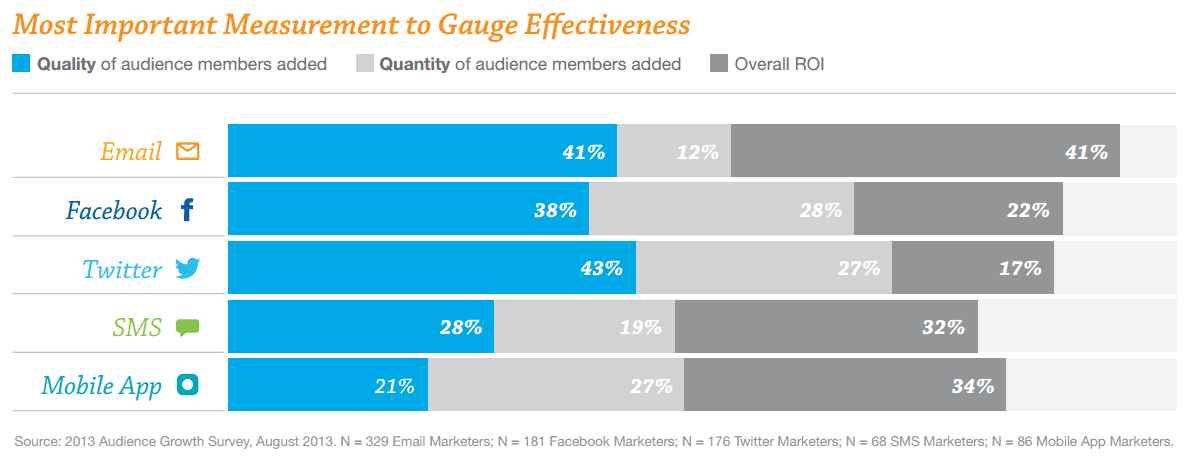
This doesn't mean social media marketing is bad or ineffective. They are just two different channels that should be used differently and with different digital marketing goals in mind because they are good at different things.
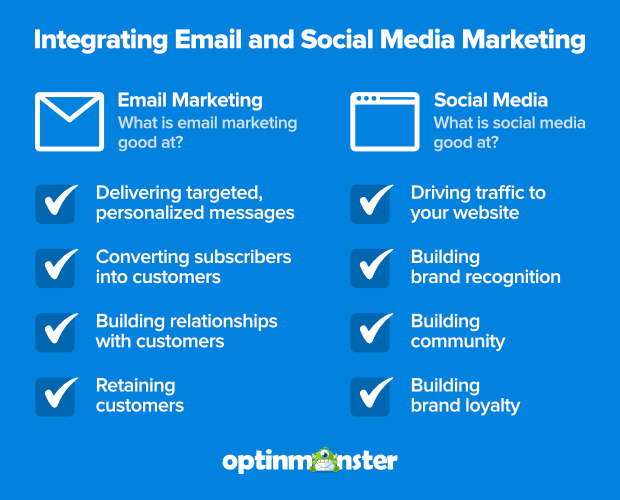
68. Can I buy an email list when I'm just starting out with email marketing?
No. You should not buy an email list ever. It can be tempting, but you've got to resist that temptation. Bought email lists don't work very well and many emails sent by this method simply get marked as spam. The emails you send out to those unsuspecting people are ineffective and you can ruin your reputation.
You should get permission from everyone to receive emails from you. This ensures you keep your sending reputation intact and comply with anti-spam laws and the terms of service of your email service provider.
The only way to get an email subscriber list that will be beneficial to your company is to grow it organically. First of all, many email service providers won't even allow you to use purchased lists. And secondly, the email addresses found on lists like those are not high-quality leads, to say the least. They will not contain people truly interested in your products or services, since these people didn't opt-in to your email list.
69. Do I need to send an email newsletter?
For some small businesses, a newsletter is the way to go. For others, a different approach works better. Find a way to give value and sell your products and services with email content. It doesn't necessarily have to be in the form of news or recent blog posts. Tailor your email structure and message types to your unique audience, and see what works best through experimentation. Each message type gathers different results. (Source: GetResponse)

70. How often should I send marketing emails?
It's a matter of experimentation and testing to see what your particular audience responds best to. Start by determining a frequency you know you can commit to and realistically be consistent with over time without stretching yourself, and then adapt by increasing it or decreasing it based on the engagement and results you see.


When determining a sending frequency you can commit to, focus not so much on fancy personalization, but more on the value, relevancy, helpfulness, and quality of your content because if your emails are all that, people won't perceive them as 'sent too much' or irrelevant, and focus on building your list organically with people that have purposefully subscribed.

71. What is the best day and time to send my marketing emails?
It depends on your audience. Testing and looking at your email analytics is the best way to find out what works best for you. As a general rule, weekends and late nights seem not to work as well as weekdays and mornings and afternoons.
72. How can I make sure my emails don't end up in the spam folder?
There are certain obvious email marketing no-nos to avoid, if you want to stay out of the spam folder. Things like using a bunch of exclamation or question marks or writing in all caps. However, spam filters are a lot more sophisticated now than they used to be. Your sending reputation and open rates play a role, too. The best way to stay out of the spam folder is not to write like a salesperson, but like a friend. Make your emails not look like marketing emails. The tone of your emails, the vocabulary you use, the text to image ratio, etc. will impact your inbox delivery rate.
73. Should I use HTML or plain text-based emails?
It depends on the email campaign. In general, you should have multiple branded email template designs. So, you have a design template for your newsletters, announcements, sales offers, etc. Make sure to A/B test your different email campaign designs and keep the ones that work best. An email marketing campaign that presents products needs to be multimedia and display large product images, stylized fonts, buttons with hyperlinks, etc. while an announcement or reminder email can be simple plain text.
As a general rule, strip down your emails as much as you can without compromising the campaign effectiveness. You need to make readers that just skim through or only look at the email without reading it at all understand what it's about at a glance and understand which action you want them to take. That means you should have a call-to-action that somehow stands out from the rest of the text. Using short paragraphs, bulleted lists, bold, italicized or underlined text, or punctuation, can make key points in your emails stand out enough not to have to use fancy HTML. In most cases, you can have very effective campaigns with high open rates, click-through rates, and conversion rates that are kept very simple with just plain text.
74. How long should my emails be?
Shorter tends to be better. The average person will only spend about 20 seconds reading an email, so use that as a guideline. More frequent but shorter emails tend to be better than less frequent longer emails, as they help you stay front of mind more and be remembered as valuable more often. If you send email less frequently than once a week and your emails will take longer than 20 seconds to read, make sure that the most important information, as well as your call to action and links, are located near the top, where they can be seen without having to scroll down. And structure your longer emails in sections with subheadings and more calls-to-action further down, just like you'd write a blog post. This helps guide readers and improves conversions for longer email marketing campaigns.
75. How do I write a great marketing email?
The single best piece of advice we can give when it comes to writing a marketing email is to keep the following in mind: The purpose of every email you write is to deepen your relationship with each individual subscriber, position yourself as an authoritative and trustworthy resource with expertise that is being helpful.
That means writing to them as if you were a friend, or at least a real-life person, rather than sounding like a used car salesman or faceless, impersonal company. Emails from friends are written conversationally and casually. Friends don't capitalize each word in the subject line, they don't include images in emails most of the time, they don't include a signature with social media links, they don't use buttons, and they don't send information they're not sure about if it's relevant or valuable to you, etc. They do have simple one sentence paragraphs of text and can have a text link in them and that's it.
76. Should I segment my email lists?
Yes. If you have the resources to write that extra content, and the flexibility within your niche to divide your subject matter up into segments, then by all means, do it. It doesn't matter how small your email list is – segmentation increases relevancy and thus improves performance. Segmenting your email list is a great way to personalize marketing messages according to subscribers' individual interests, making them that much more effective.
77. Which email metrics should I be looking at?
The two most important metrics for email marketing are the open rate and the click-through rate. If your emails aren't getting opened, subscribers will never see your full marketing message – and if they're opening them, but not clicking through to your site, your emails aren't converting. But there's more. Have a look at this overview of email metrics and what they mean.
78. How can I get subscribers to open my emails?
Nail your email subject line. The key to getting subscribers to open your emails is by writing a stellar subject line every time. Other than your name or your business name, that's all they have to help them make that split-second decision when they see your email in their inbox.
Including personalization in your subject line is an easy way to increase opens. Consumers open emails with personalized subject lines at a 50% higher rate compared to emails without personalized subject lines, yet only 2% of emails employ personalization.
Learn how split testing subject lines can help you increase your open rates.
79. How do I write a good subject line?
The best subject lines entice curiosity and teaser your email content while being short and to the point. We advise to A/B test subject lines to see which types of subject lines work best with your audience.
Check out our subject line tips that help you craft creative subject lines that stand out.
80. How can I increase my click-through rate?
People are likely to do something if you directly ask them to. They are even more likely to do it if you tell them why doing it benefits them, knowing that they want that benefit. Keep that in mind when crafting and placing your call-to-action in your emails and make sure to have a call-to-action in every email. You'll see a boost in your click-through rate.
81. What should my email From line / From name say?
Individual's names or individual's names in combination with a company name tend to work better. That's because people seek a personal connection more than they're looking to receive commercial messages from a business. The most important thing is that your From email address and name are recognizable. If subscribers see an unfamiliar name on the From line, they might just mark the email as spam or delete it without opening.
82. What does the CAN-SPAM Act law say?
The CAN-SPAM Act is a law that sets the rules for commercial emails. It affects everybody that uses email in their business.
The CAN-SPAM Act establishes requirements for commercial messages, gives recipients the right to have you stop emailing them, and spells out tough penalties for violations.
It doesn't just apply to bulk email. It covers 'any electronic mail message the primary purpose of which is the commercial advertisement or promotion of a commercial product or service'. This includes emails that promote content on commercial websites and business-to-business emails.
Each separate email in violation of the CAN-SPAM Act is subject to penalties of up to $43,792, so non-compliance can be costly. But following the law isn't complicated. Here's a rundown of CAN-SPAM's main requirements:
- Don't use false or misleading header information.
- Don't use deceptive subject lines.
- Identify the message as an ad.
- Tell recipients where you're located.
- Tell recipients how to opt out of receiving future email from you.
- Honor opt-out requests promptly.
- Monitor what others are doing on your behalf.
Learn more in the compliance guide for businesses on the Federal Trade Commission's website.
Lead Generation Digital Marketing Questions
83. What is lead generation?
Lead generation is the process of generating interest for a product or service with the goal of turning that interest into a sale. In digital marketing, it typically involves collecting a visitor's contact information (called a lead) via a web form.
With lead generation, the focus is on conversions. You can use the collected contact info like name, email address, and phone number, to reach out and nurture them with your content and sell your products and services.
Social Media Marketing Digital Marketing Questions
84. Can social media marketing really help my business?
Yes. Social media marketing can help your small business:
- Get exposure
- Raise brand awareness
- Increase your reach
- Enhance public relations
- Get more website traffic
- Get more engagement e.g. messages, mentions, tags, video views, likes, comments, shares, retweets, event responses, offer claims, followers, subscribers, page likes
- Generate more leads & attract more customers
- Offer customer service and customer support
- Do research & development, social listening
- Build your brand reputation, collect reviews and testimonials
- Get more sales e.g. catalog sales, store traffic
- Build your own online community
- Encourage user generated content e.g. through branded hashtags
- Get brand advocates
85. What are the benefits of social media marketing for my small business?
Social media marketing is a powerful way for small businesses to reach prospects and customers.
Chances are, your customers are already interacting with other brands through social media, and if you're not speaking directly to your audience through social media platforms as well, you're missing out.
Great marketing on social media can bring remarkable success to your small business, create devoted brand advocates, and even drive leads and sales.
Social media allows you to be accessible to your customer and prospective clients. It helps you to build relationships, establish trust, thought leadership, showcase expertise, share services, products, and solutions, answers to questions, and more. And you can do all of this for free.
86. How should I measure social media marketing success?
Measure conversions and ROI. It's easy to get distracted by vanity metrics like counting the number of followers, traffic, reach, etc. Seeing increases in those metrics is only a good thing if conversions increase as well.
You should look at the percentages, not toal numbers. Out of how many people in total, how many have taken the desired action. This is called your conversion rate. It should increase alongside your total audience size, reach, and engagement.
Lastly, the increase in conversions you're seeing should bring in more revenue than what you've invested in social media marketing, which means your social media successes have a positive return on investment as well. If you're doing organic social media marketing, meaning you post content for free and don't pay for ads, all your're investing is your time and your ROI will be infinite.
87. How much does social media marketing cost? What's the ROI?
It doesn't have to coat anything. You can start with simply investing your time and creating amazing content that's tailored to your buyer personas.
88. Which social media platforms should my small business have a presence on?
Be where your audience is at and where they are receptive for your content. You want to choose the social media platform where you know from research that your target audience hangs out on, and you have verified the intent and sentiment on the platform is aligned with you being able to reach your marketing goals and people being receptive to your content on the platform.
In this digital marketing blog post, you can learn more about how to choose the right social media platforms.
89. Is social media marketing better for B2C or B2B businesses?
As a tool for connecting a business with its customers, social media is vital to both.
90. How should I be using Facebook for
marketing?
91. How should I be
using Twitter for marketing?
92. How should
I be using LinkedIn for marketing?
93. How
should I be using YouTube for
marketing?
94. How should I be using
Instagram for marketing?
95. How should I be
using TikTok for marketing?
96. How
should I be using Pinterest for
marketing?
There is different user data and there are different pros and cons for every social media platform. Covering this in this Q&A would go beyond the scope, which is why we've linked out to this social media platform comparison guide and this comparison of the most popular social media platforms for you to check out to learn more.
97. How can I take control of my brand online through social media marketing?
Your brand is what other people think you are. It's your reputation. It's others' perception about you. It's what others say about you when you're not in the room. You can take control of your brand on social media by strategically putting content out there that lets you shine in the light you want to be seen in and steer the conversation.
98. What type of social media content converts best?
The type that resonates the most with YOUR unique audience, builds the required trust, establishes the required expertise and authority, and communicates that you have the best solution to their problem in the most effective way. Only you can find out what type of content that will be for you – through testing, measuring, analyzing, adapting, and testing again.
99. How much time should social media marketing take each week?
Determine how much time you spend doing what in your small business by looking at the importance and urgency of the tasks. If social media marketing brings you only a small fraction of business, spend less than if it is responsible for most of your sales. Find a sweet spot without neglecting your other responsibilities and make sure you focus the most time on the digital marketing channel that delivers the best results for your small business.
100. How long does it take before I'll start seeing results from social media marketing?
With organic social media marketing that's done right, you can see results pretty much instantly and they get stronger over time.
101. What are some common social media marketing mistakes small businesses make?
One of the worst mistakes is inconsistency. Only posting sporadically, and not responding when consumers reach out to engage. Another big mistake is using social media as a place to only announce your own content without ever engaging in discussions with your audience. Another biggie is spreading themselves too thin and having presences on multiple social networks without a dedicated strategy for each, not enough resources, capacity, time, money, or knowledge to successfully and strategically manage them.
102. What are some general tips for social media success?
Post consistently. Let your passion and personality shine through. Engage in conversations. Answer questions. Encourage audience engagement. Provide valuable content for free, without getting salesy. And be creative and test.
103. How should I start a social media campaign for my small business?
Start by setting the goal and key performance indicators (KPIs) to measure. Then reverse engineer your strategy. From the research, to the content creation, to the best time to publish, etc. It all should be aligned to reach your goal.
Conclusion
Digital marketing doesn't have to be overwhelming. A little bit of knowledge goes a long way. I hope this post has helped you not to feel about digital marketing like it’s a foreign language anymore. You now have the resources you need to start building and optimizing your small business marketing strategy to attract new customers and grow your small business. Be sure to check out the variety of other resources in our digital marketing resource center for small businesses. Which answer has helped you out the most?
Activate Your Entire Customer Experience
Try ActiveCampaign – The #1 Automation Platform – For Small Businesses
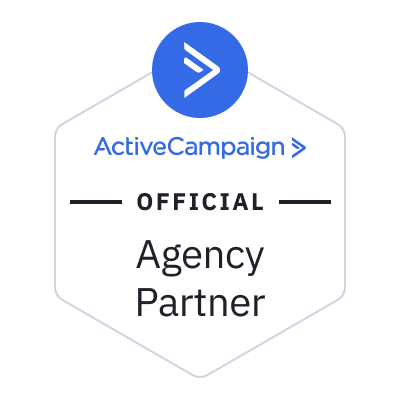 Try ActiveCampaign Today For Free
Try ActiveCampaign Today For Free


